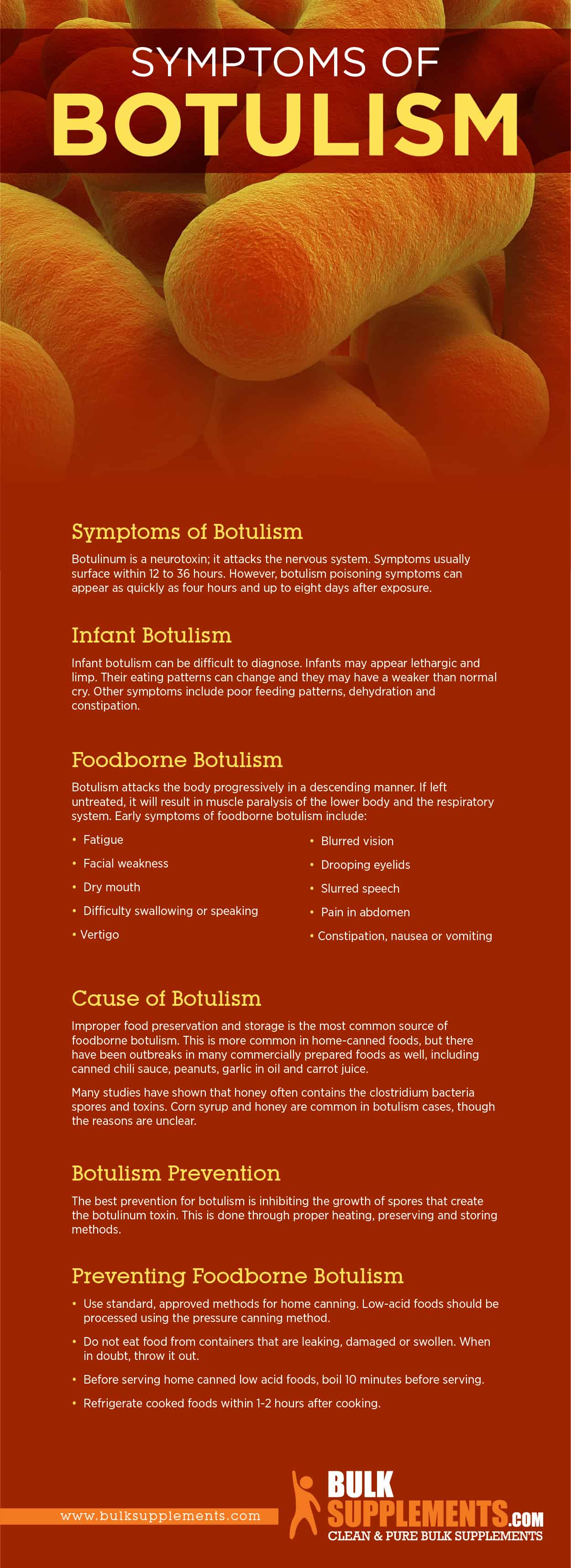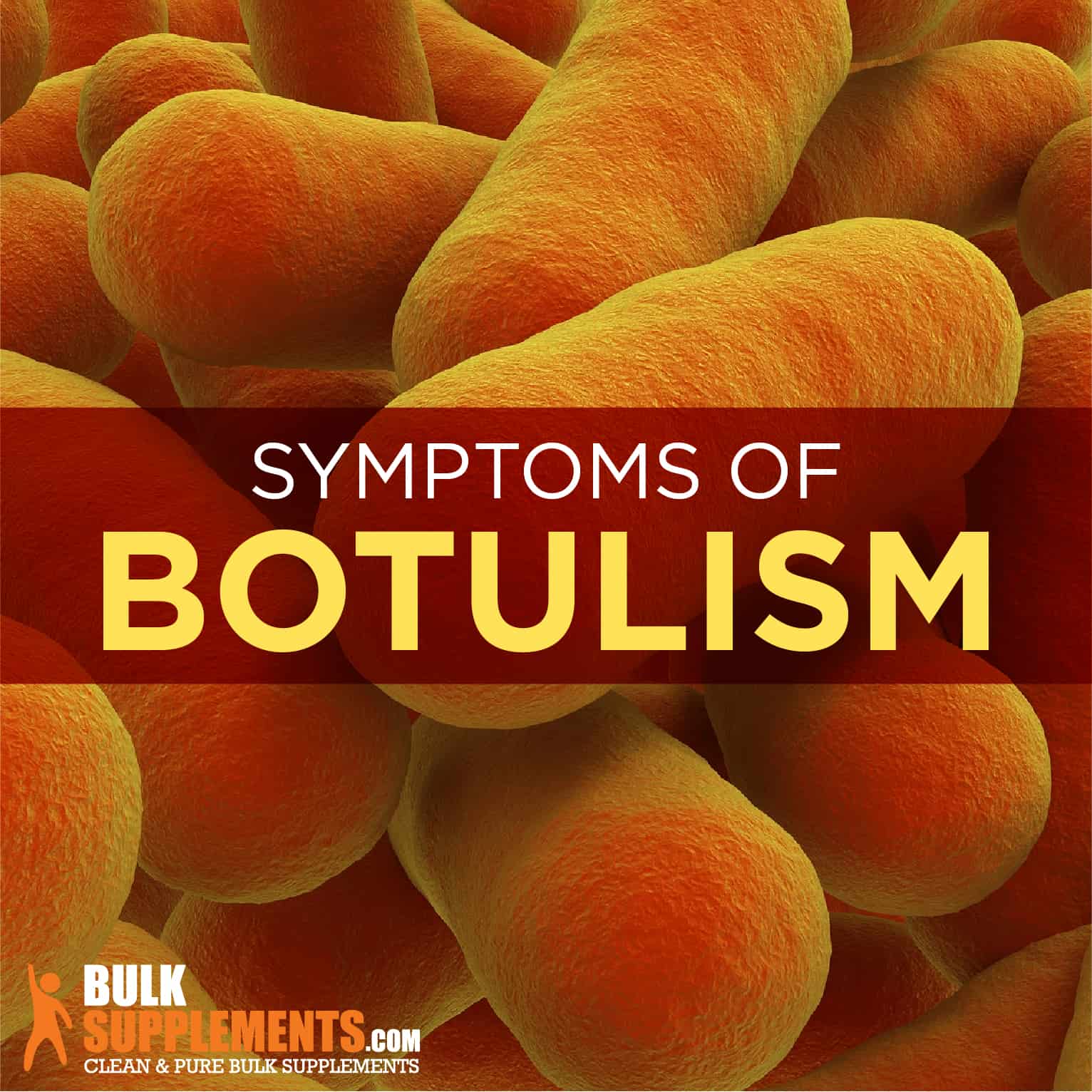What is Botulism?
Botulism is a serious illness caused by a bacteria-generated toxin (botulinum neurotoxin). When it goes undiagnosed and untreated, it can be fatal. This illness causes paralysis, often beginning in the face, then spreading downward to the lower extremities. When it reaches the muscles involved in breathing, it may result in respiratory failure.
Clostridium botulinum bacteria exist in soil, water and other areas of our environment, but they seldom cause a problem. The bacteria create protective spores, which thrive in an environment that is low in oxygen, acid and salt. They also need a certain level of moisture and the perfect temperature range. With the right conditions, though, the spores grow and produce the botulinum neurotoxin, which is one of the deadliest biological poisons. In fact, it’s the toxin, not the bacteria itself, that causes botulism.
Types of Botulism
- Foodborne (classical) botulism happens by eating foods tainted with the botulinum toxin. The source of foodborne botulism is often improperly canned, preserved or stored foods.
- Infant botulism is the most diagnosed type of botulism. It can occur when the bacteria enters an infant’s intestines. The spores of the bacteria grow, producing the toxin. Infants can ingest botulinum bacteria through honey or environmental exposure (x). Adults can also experience a similar form of intestinal botulism. Known as adult intestinal colonization, it is more likely to occur in adults with a chronic illness in the gastrointestinal tract.
- Wound botulism occurs when the bacteria spores enter a wound and produce the toxin. Wound botulism has occurred in patients after surgery or after an extensive injury, such as a motorcycle accident. People who inject drugs are at higher risk of wound botulism.
- Animal botulism has a high mortality rate and presents additional problems to humans, since food from the affected animals can spread the disease (x).
- Latrogenic botulism is a rare side effect of the therapeutic use of botulinum toxin injections. Though these medical injections are usually safe, latrogenic botulism can arise as a complication in some patients (x).
Symptoms of Botulism
Botulinum is a neurotoxin; it attacks the nervous system. Symptoms usually surface within 12 to 36 hours. However, it’s poisoning symptoms can appear as quickly as four hours and up to eight days after exposure (x).
Infant Botulism
Infant botulism can be difficult to diagnose. Infants may appear lethargic and limp. Their eating patterns can change and they may have a weaker than normal cry. Other symptoms include poor feeding patterns, dehydration and constipation.
Foodborne Botulism
Botulism attacks the body progressively in a descending manner. If left untreated, it will result in muscle paralysis of the lower body and the respiratory system. Early symptoms of foodborne botulism include:
- Fatigue
- Facial weakness
- Dry mouth
- Difficulty swallowing or speaking
- Vertigo
- Blurred vision
- Drooping eyelids
- Slurred speech
- Pain in abdomen
- Constipation, nausea or vomiting

Cause of Botulism
Improper food preservation and storage is the most common source of foodborne botulism. This is more common in home-canned foods, but there have been outbreaks in many commercially prepared foods as well, including canned chili sauce, peanuts, garlic in oil and carrot juice (x).
Many studies have shown that honey often contains the clostridium bacteria spores and toxins. Corn syrup and honey are common in botulism cases, though the reasons are unclear (x).
Botulism Prevention
The best prevention for it is inhibiting the growth of spores that create the botulinum toxin. This is done through proper heating, preserving and storing methods.
Preventing Foodborne Botulism
- Use standard, approved methods for home canning. Low-acid foods should be processed using the pressure canning method.
- Do not eat food from containers that are leaking, damaged or swollen. When in doubt, throw it out.
- When handling home canned low acid foods, boil 10 minutes before serving.
- Refrigerate cooked foods within 1-2 hours after cooking.
Preventing Infant Botulism
Infant botulism may be prevented by avoiding honey for infants less than one year old when their digestive tract is less developed (x, x).
Botulism Treatment
Occurrence is low, but without prompt treatment, the mortality rate is high. Botulism can be fatal in 5-10 percent of cases. If you or someone you know has symptoms, see your doctor or go to the emergency room immediately (x, x).
Proper Diagnosis
To make a proper diagnosis, a health professional will ask questions about symptoms. Some illnesses mimic the symptoms of botulism, such as stroke, Guillain-Barre syndrome and myasthenia gravis. To get proper treatment, a person may have a brain scan and lab tests taken. If it is indeed the issue, treatment will start immediately (x).
Antitoxin
Those with foodborne or wound botulism will typically receive an injection of antitoxin. The antitoxin will attack the toxin that is still in the bloodstream and prevent further damage, though it cannot reverse any damage to the nervous system. Nerves regenerate and many people recover fully from the effects of the illness (x). Infants are given a different antitoxin — botulism immune globulin.
Antibiotics
Those with wound botulism are given antibiotics. The doctor may first surgically remove the source of the toxin on the wound.
Respiratory Help
If the botulism has affected the respiratory system, the patient may be ventilated until the effect of the toxin decreases.
Rehabilitation
Some patients need extended therapy to improve speech, swallowing and other functions. Infants with it are given nutritional and respiratory support until nerves are regenerated. Some children may require tube feeding, and they may exhibit an ongoing lack of muscle tone (x).
Supplements to Help Botulism Recovery
This is a life-threatening illness that should be treated with the help of a health care professional. Its recovery involves the repair and regeneration of nerves. Luckily, though, there are natural supplements to aid symptoms of nervous system weakness.
The following nutrients are capable of supporting the health of the nervous system:
- Vitamin B1 in the form of benfotiamine, provides support to peripheral nerve function (x, x).
- Vitamin B12 can benefit the repair process after nerve injury (x, x).
- Alpha lipoic acid used as a therapeutic for the central nervous system in scientific studies, has the ability to promote healthy and normal nerve fibers (x, x).
- Acetyl L-carnitine is an amino acid that shows positive research results for supporting the nerves. Studies show that acetyl L-carnitine can reduce pain and promote nerve regeneration (x).
- Vitamin B Complex may facilitate the recovery of nerve function (x, x).
The Bottom Line
Though the C. botulism bacteria live all around us, specific conditions cause it to produce the deadly toxin and become a threat. There are different types of botulism, though some are more rare than others. Honey and improperly preserved home canned and commercial foods are sources of botulism. This life-threatening disease attacks the nervous system and eventually causes paralysis if left untreated. After diagnosis, it is treated with antitoxin and other medications if needed. Sometimes rehabilitation is necessary to recover patient function. There are supplements that may assist recovery, though it should never be self-treated at home.


